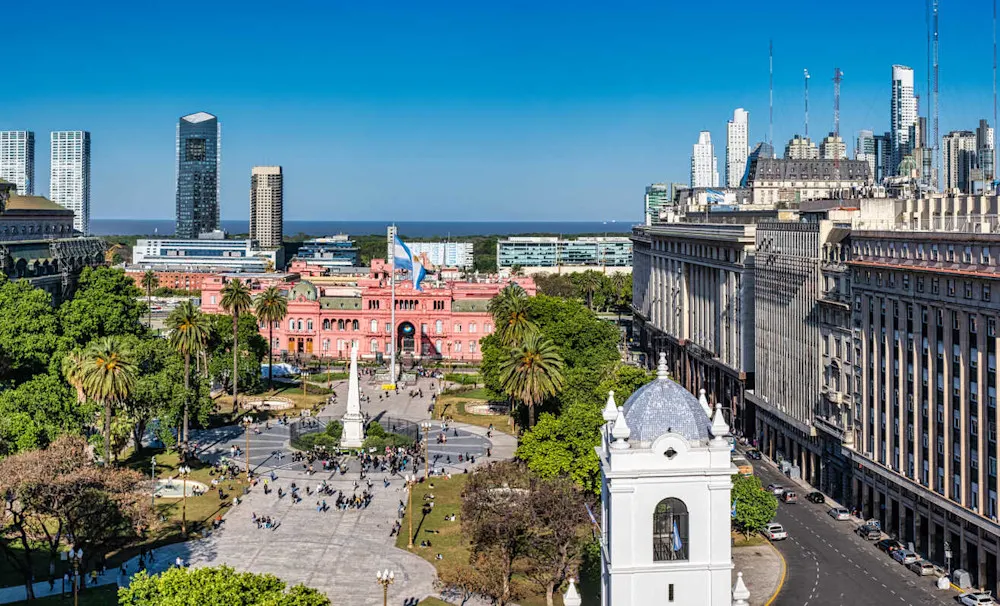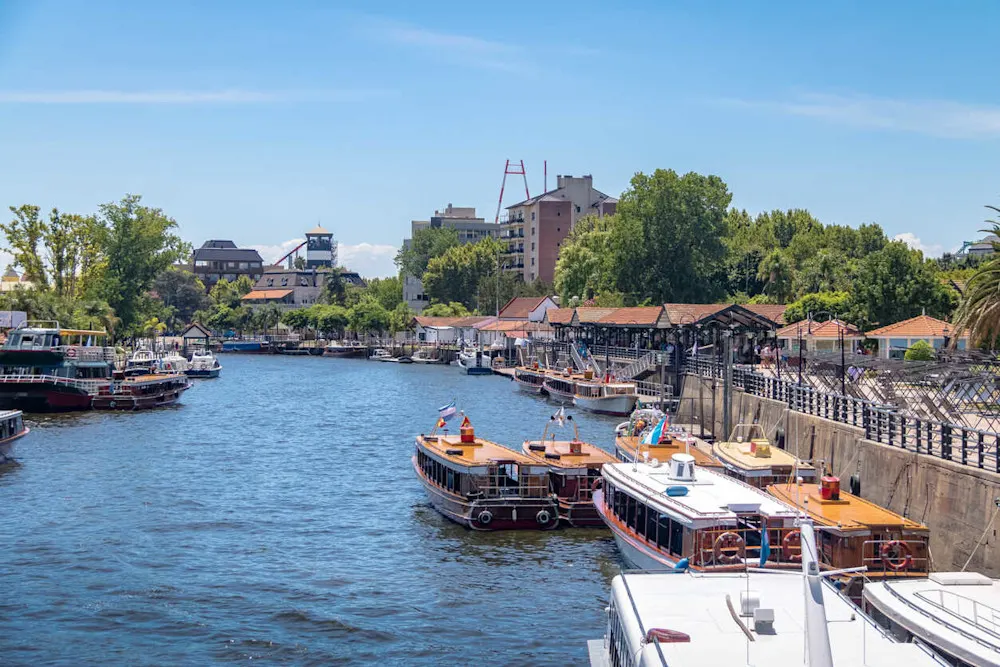Vibrant cities, world-class food and wines, a warm and sophisticated culture, stunning natural landscapes, and a long menu of outdoor and recreational opportunities make Argentina an amazing place to visit and spend time.
And the economic potential is huge, with its vast regions of fertile farmland, oil, gas, and lithium deposits, and an educated workforce. (Argentina boasts a 99.5% literacy rate.)
I’ve lived in Uruguay, next to Argentina, for going on 20 years. And so many times I’ve heard people say, if Argentina ever got its political and economic act together, it could rank among the best places in the world to live and invest. They said it like it could never really happen. But with recent events, it’s now a possibility.
Your chance to retire overseas now
Your chance to retire overseas now
Learn more about Uruguay and other destinations by signing up to our daily IL Postcards e-letter and we'll immediately send you a free report: 20 Countries Compared, Contrasted, Ranked, and Rated.
You don’t have to be rich to enjoy a pampered retirement, you just need to know where to go.
With our 34th Annual Global Retirement Index, our experts hand you a detailed roadmap. Details and a Special Offer Here!

By submitting your email address, you will receive a free subscription to IL Postcards, Overseas Dream Home, The Untourist Daily and special offers from International Living and our affiliates. You can unsubscribe at any time, and we encourage you to read more about our Privacy Policy.
Argentina’s New Chapter: A Game-Changer for Foreign Investors
On Monday, April 14, Argentina officially lifted its currency and capital controls—dramatic reforms that signal a bold move to reintegrate with the global economy and welcome international investors.
But what does that actually mean if you’re considering investing in Argentina or retiring there? Let’s break it down—but first, some context.
A Brief History of Argentina’s Economy
From the 1860s to the early 1900s, Argentina's agricultural-based economy grew like gangbusters. During those years, it attracted a lot of foreign investment, which created jobs and supported the country's development. By 1913, Argentina was among the world's 10 wealthiest nations per capita.
But things went south in the 1930s, and from the 1970s onward, Argentina faced cycles of hyperinflation, debt defaults, and banking crises. By 2023, over 40% of Argentinians lived in poverty, and the country’s foreign currency reserves were nearly depleted.
The World’s Best Retirement Havens for 2025
The World’s Best Retirement Havens for 2025
To get further information on Uruguay and more retirement destinations, sign up to receive your free report: 20 Countries Compared, Contrasted, Ranked, and Rated.
You don’t have to be rich to enjoy a pampered retirement, you just need to know where to go.
With our 34th Annual Global Retirement Index, our experts hand you a detailed roadmap. Details and a Special Offer Here!

By submitting your email address, you will receive a free subscription to IL Postcards, Overseas Dream Home, The Untourist Daily and special offers from International Living and our affiliates. You can unsubscribe at any time, and we encourage you to read more about our Privacy Policy.
Milei’s Election—and a Bold Economic Turnaround
In the 2023 elections, the public rejected the status quo. Riding a wave of dissatisfaction, Javier Milei—a chainsaw-wielding libertarian economist—was elected president in December 2023 with a mandate to overhaul the economy.
Just over a year into his presidency, Milei is making real progress. Argentina posted a budget surplus, significantly reduced inflation, and streamlined its bloated regulatory system, averaging two rule eliminations or revisions per day.
He’s also simplified the tax code, aiming to eliminate 90% of taxable events (not revenue), making compliance easier for individuals and businesses alike.
His administration is also attracting billions of dollars from Argentina's unreported economy back into the formal economy with easier-to-understand business rules and a tax amnesty program.
Another accomplishment is closing the gap between the Argentine peso’s official rate, set by the government, and the blue dollar rate, which is the free market rate. (Until now, only available at informal currency exchanges.)
At one point, you could buy almost twice as many Argentine pesos at the blue dollar rate as at the official exchange rate. However, Milei's administration removed the gap. (An important step in the preparation for removing the country’s currency controls.)
Of all the reforms, removing currency and capital controls is the most crucial in making Argentina a safe place for international investors.
Why Lifting Currency and Capital Controls Matters

Before lifting the currency controls, if an Argentine wanted to legally buy US dollars, they would need permission, be limited to $200 per month, buy the dollars at an exchange rate dictated by the government, and pay a heavy tax for the privilege to do so.
Now they can buy and sell foreign currencies without permission, without a limit, and aren’t taxed for doing so.
As a foreigner, you can now buy pesos at market rate without going to an informal currency exchange. This also makes it easier for you to invest and pay people who do work for you in Argentina.
Before lifting the capital controls, it could be difficult and expensive to move your US dollars in and out of Argentina, and in some cases, illegal to take your money out.
Now, you can move your money, including investment profits, out of the country. And locals can invest their money outside of Argentina.
Opening Up the Real Estate Market
Before these reforms, Argentina’s property market was practically off-limits to all but locals and a few well-connected international investors who could navigate a maze of informal exchanges and regulations.
With those barriers now lifted, Argentina’s real estate market is fully open to the world—and that will likely drive property values up as demand increases.
The World’s Best Retirement Havens for 2025
The World’s Best Retirement Havens for 2025
To get further information on Chile and more retirement destinations, sign up to receive your free report: 20 Countries Compared, Contrasted, Ranked, and Rated. You don’t have to be rich to enjoy a pampered retirement, you just need to know where to go.
With our 34th Annual Global Retirement Index, our experts hand you a detailed roadmap. Details and a Special Offer Here!

By submitting your email address, you will receive a free subscription to IL Postcards, Overseas Dream Home, The Untourist Daily and special offers from International Living and our affiliates. You can unsubscribe at any time, and we encourage you to read more about our Privacy Policy.
The Debate: Is Now the Right Time to Lift Capital Controls?

While the inflation rate of the Argentine peso is coming down, the peso's value is going up against the US dollar, to the point that many goods are getting more expensive in dollar terms, especially fast food, processed food, manufactured goods, and clothing.
Does this mean the peso is very strong? Or does it mean the peso is overvalued?
Two main schools of thought emerged leading up to April 14.
School of Thought #1: Move Fast, Trust the Market
Proponents of this view argue that the current exchange rate—now that the official and market rates have converged—accurately reflects the peso’s true market value. From this perspective, lifting the controls now is not only appropriate but essential for restoring investor confidence and integrating Argentina back into the global economy.
This camp believes that delaying reforms would only postpone the inevitable and discourage desperately needed foreign investment. In fact, some go even further, arguing that Argentina should abandon the peso altogether and officially adopt the US dollar as its legal currency. Doing so, they say, would strip away monetary dislocations and restore trust in the financial system, much like Ecuador did in the early 2000s.
Supporters of this approach also contend that once capital controls are fully lifted, the expected inflow of investment capital will provide a stabilizing cushion, helping the country weather any transitional turbulence. And they warn that if the peso continues to rise unchecked, Argentina’s exports could become too expensive on the global market, undermining a key pillar of economic recovery.
School of Thought #2: Proceed with Caution, Secure Political Support
Critics of a rapid liberalization strategy believe the peso’s current strength could be deceptive. They suggest that elements of the existing reform mix—such as lingering regulatory structures or artificial constraints—may be inflating its value. If that’s the case, then suddenly removing capital controls could trigger a sharp correction in the peso’s value, leading to a resurgence of inflation and financial instability.
This group advocates a more gradual approach. They argue that President Milei should first focus on building broader political and public support, particularly with the upcoming congressional elections in October 2025. With a stronger political mandate, the government could then begin phasing out capital controls throughout 2026 and into 2027, giving them the ability to backtrack, tweak, or pause as necessary to help minimize economic pain.
There’s also concern that a devalued peso would worsen Argentina’s already heavy debt burden, most of which is denominated in US dollars. A sudden drop in the peso’s value could dramatically increase the cost of servicing that debt, potentially triggering a new crisis.
What Milei Actually Did: A Strategic Third Way
However, Milei’s actions didn’t line up with either side. For him, the main issue was securing enough cash reserves to weather the transition. And on Friday, April 11, he completed a $20 billion loan agreement with the IMF and established credit lines with two other international organizations. And on Monday, April 14, he lifted Argentina’s currency and capital controls.
The IMF money will bolster Argentina's fiscal reserves to weather some degree of market turbulence in the early days without the controls. (No matter what, I imagine many people in Argentina will want to sell pesos for dollars.)
Milei is also working in partnership with Argentina's central bank, which will let the peso float between 1,000 and 1,400 pesos per dollar. So it can find its level, but with safeguards to prevent extreme swings.
Besides the benefit of extra reserves, forming an alliance with Argentina's Central Bank, the IMF, and other international organizations may create a sense of backing and consensus, which may help instill public confidence and unity during an economic dip.
The IMF alliance may also help Argentina navigate a trade deal with the US in the midst of turmoil around US trade tariffs. After completing the IMF deal, Milei said, "We are in a better position than ever to withstand external turbulence."
The World’s Best Retirement Havens for 2025
The World’s Best Retirement Havens for 2025
To get further information on Brazil and more retirement destinations, sign up to receive your free report: 20 Countries Compared, Contrasted, Ranked, and Rated.
You don’t have to be rich to enjoy a pampered retirement, you just need to know where to go.
With our 34th Annual Global Retirement Index, our experts hand you a detailed roadmap. Details and a Special Offer Here!

By submitting your email address, you will receive a free subscription to IL Postcards, Overseas Dream Home, The Untourist Daily and special offers from International Living and our affiliates. You can unsubscribe at any time, and we encourage you to read more about our Privacy Policy.
Final Thoughts: Why Now is a Critical Moment

For Americans thinking about living or investing overseas, Argentina now presents a rare opportunity. With reforms in place, financial barriers removed, and international backing secured, this could be the most accessible and potentially profitable time to explore Argentina in decades.
Whether you're looking to buy property, diversify your portfolio, or retire abroad in a place with incredible food, culture, and natural beauty—Argentina just might be the door you’ve been waiting for.
